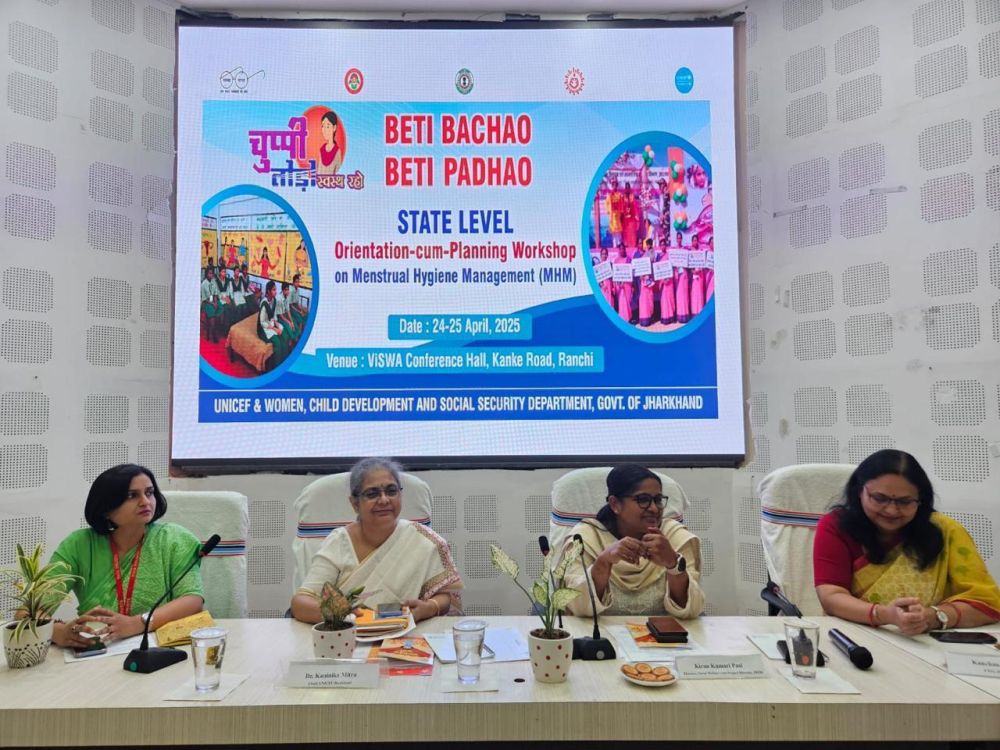
The Department of Women and Child Development (DWCD), Government of Jharkhand, in collaboration with UNICEF, successfully organized State Level Training of Trainers (ToT) on Menstrual Hygiene Management (MHM) on 24-25 April at the Visvesvaraya Institute of Sanitation & Water Academy (ViSWA), Kanke, Ranchi.
This initiative aimed to build a dedicated pool of 50 Master Trainers who will now serve as key facilitators of menstrual health awareness at divisional and block levels across the state.
Participants were drawn from all 24 districts of Jharkhand, including District Social Welfare Officers (DSWOs), Child Development Project Officers (CDPOs), and Lady Supervisors (LSs). Their participation reflects the government’s focus on community-led interventions and local leadership in breaking menstrual taboos.
The initiative aligns with flagship schemes like Beti Bachao, Beti Padhao and aims to empower adolescent girls and women by addressing menstrual stigma. Speaking at the event, Smt. Kiran Kumari Pasi, Director, DWCD, stressed the impact of menstrual taboos on girls’ education and emphasized district-level outreach: “The open sky is waiting for every woman and girl. Menstruation should not become a hurdle in your dreams.”
Dr. Kaninika Mitra, Chief of Field Office, UNICEF Jharkhand, lauded the government’s inclusive and holistic approach and underscored the need to involve boys and men in menstrual health conversations. She also emphasized improving access to sanitary products to reduce stigma and encourage healthy practices.
Highlighting the convergence of health and livelihood, Smt. Kanchan Singh, CEO, Jharkhand State Livelihood Promotion Society (JSLPS), shared that 14 sanitary pad production units operated by Self-Help Groups (SHGs) are currently active across the state, reaching over 32 lakh rural women. More units are planned, linking menstrual hygiene with economic empowerment.
Dr. Laxmi Saxena, WASH Officer and Kumar Premchand WASH specialist, UNICEF Jharkhand, emphasized on 3 As i.e, Awareness, Access and Availability of MHM program and how strong convergence with different key departments is crucial for successful implementation of MHM program. Referencing the NFHS data, she emphasized for a robust supply chain for menstrual products and encouraged the use of biodegradable options to promote environmental sustainability.
Mr. Pritish Nayak, Nutritional Specialist at UNICEF Jharkhand, highlighted the nutritional value of foods and their health benefits, emphasized the integration of WASH and nutrition, and underscored the importance of departmental convergence to ensure program sustainability.
Dr. Vandita, Government Hospital, Ranchi stressed menstrual health as vital for well-being, urging hygiene, safe product use, and awareness of conditions like PCOD/PCOS. Early diagnosis and knowledge empower girls and women with confidence, dignity, and spread awareness on cervical cancer and effective health management.
The training employed interactive and participatory approaches, including role plays, group work, and feedback sessions. Participants received joint certification from DWCD and UNICEF, enabling them to conduct similar trainings at district and block levels. UNICEF supported the program with technical and logistical assistance, providing training modules, expert facilitation, and IEC materials. Partner organizations LEADS and CINI, Tata Trust were also participated the program.
This state-level ToT marks a pivotal step in normalizing menstrual health conversations and addressing social taboos. It strengthens institutional mechanisms and reinforces Jharkhand’s commitment to promoting health, dignity, and opportunity for every girl and woman in the state.